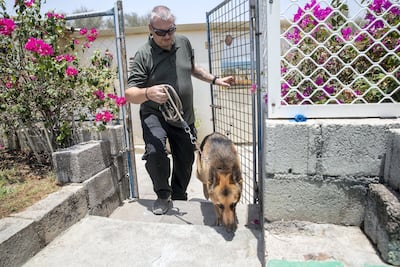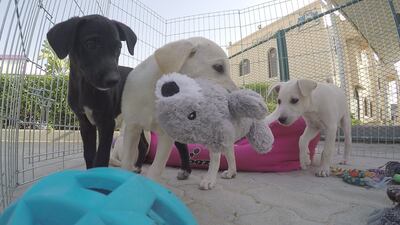Strict new measures are being introduced in Umm Al Quwain to tackle the growing problem of stray animals roaming the emirate.
A royal decree announced on Thursday states that unclaimed dogs and cats will be seized and confined in designated enclosures.
Owners have three days to submit a pet retrieval request, with the department stating it would dispose of unclaimed animals in an appropriate manner.
One shelter in the emirate said it housed around 1,300 animals, while another pet boarding service operator said it was being overwhelmed with demand to home abandoned animals.
Local shelters advised owners who have not seen their pets recently to contact the municipality department immediately to check they had not been rounded up by mistake.
The decree, due to be published in the Official Gazette, said the department must follow established procedures for issuing necessary approvals to manage stray animals.
Positive step
The approvals include authorising judicial police officers to control and prove violations in accordance with the local and national legislation.
Neil Anderson, a dog trainer who runs boarding kennels in Ras Al Khaimah, said the decree had potential to tackle a challenging issue.
“Any announcement from government that recognises there is a problem is always welcome. The intent is good,” he said.
“If a dog owner comes home and their dog is missing, the first place they should check is the local government dog pound.
“So this announcement makes sense, to try and get people to be more responsible and keep their dogs safe.”
The move follows the launch of an animal welfare programme in Abu Dhabi after hundreds of stray cats were abandoned in desert areas.
In October, animal welfare groups demanded an investigation by the emirate's Department of Municipalities and Transport after more than 150 cats were found dumped in Al Falah.
Care programme
Since then, the Community Animal Care Programme has attracted volunteers to support regular trap, neuter and return (TNR) programmes, and education workshops across the emirate to control stray cat populations.
“There are lots of strays that don't belong to anybody running around all over the streets,” said Mr Anderson.
“That’s where I think this [Umm Al Quwain] ruling is targeted. These dogs are a risk to themselves, and also to the wider community in many respects, so this policy is understandable.
“I’m not sure it’s solving the problem, though, as it is not addressing the issue of people breeding dogs like there's no tomorrow.
“This year, we’ve got more rescue dogs in the kennels than we’ve ever had.”
Watch: UAE residents help stray animals after record rainfall
Who's who in Yemen conflict
Houthis: Iran-backed rebels who occupy Sanaa and run unrecognised government
Yemeni government: Exiled government in Aden led by eight-member Presidential Leadership Council
Southern Transitional Council: Faction in Yemeni government that seeks autonomy for the south
Habrish 'rebels': Tribal-backed forces feuding with STC over control of oil in government territory
2017%20RESULTS%3A%20FRENCH%20VOTERS%20IN%20UK
%3Cp%3E%3Cstrong%3EFirst%20round%3C%2Fstrong%3E%3Cbr%3EEmmanuel%20Macron%3A%2051.1%25%3Cbr%3EFrancois%20Fillon%3A%2024.2%25%3Cbr%3EJean-Luc%20Melenchon%3A%2011.8%25%3Cbr%3EBenoit%20Hamon%3A%207.0%25%3Cbr%3EMarine%20Le%20Pen%3A%202.9%25%3Cbr%3E%3Cbr%3E%3Cstrong%3ESecond%20round%3C%2Fstrong%3E%3Cbr%3EEmmanuel%20Macron%3A%2095.1%25%3Cbr%3EMarine%20Le%20Pen%3A%204.9%25%26nbsp%3B%3C%2Fp%3E%0A
What is blockchain?
Blockchain is a form of distributed ledger technology, a digital system in which data is recorded across multiple places at the same time. Unlike traditional databases, DLTs have no central administrator or centralised data storage. They are transparent because the data is visible and, because they are automatically replicated and impossible to be tampered with, they are secure.
The main difference between blockchain and other forms of DLT is the way data is stored as ‘blocks’ – new transactions are added to the existing ‘chain’ of past transactions, hence the name ‘blockchain’. It is impossible to delete or modify information on the chain due to the replication of blocks across various locations.
Blockchain is mostly associated with cryptocurrency Bitcoin. Due to the inability to tamper with transactions, advocates say this makes the currency more secure and safer than traditional systems. It is maintained by a network of people referred to as ‘miners’, who receive rewards for solving complex mathematical equations that enable transactions to go through.
However, one of the major problems that has come to light has been the presence of illicit material buried in the Bitcoin blockchain, linking it to the dark web.
Other blockchain platforms can offer things like smart contracts, which are automatically implemented when specific conditions from all interested parties are reached, cutting the time involved and the risk of mistakes. Another use could be storing medical records, as patients can be confident their information cannot be changed. The technology can also be used in supply chains, voting and has the potential to used for storing property records.
Cultural fiesta
What: The Al Burda Festival
When: November 14 (from 10am)
Where: Warehouse421, Abu Dhabi
The Al Burda Festival is a celebration of Islamic art and culture, featuring talks, performances and exhibitions. Organised by the Ministry of Culture and Knowledge Development, this one-day event opens with a session on the future of Islamic art. With this in mind, it is followed by a number of workshops and “masterclass” sessions in everything from calligraphy and typography to geometry and the origins of Islamic design. There will also be discussions on subjects including ‘Who is the Audience for Islamic Art?’ and ‘New Markets for Islamic Design.’ A live performance from Kuwaiti guitarist Yousif Yaseen should be one of the highlights of the day.
The specs
- Engine: 3.9-litre twin-turbo V8
- Power: 640hp
- Torque: 760nm
- On sale: 2026
- Price: Not announced yet



